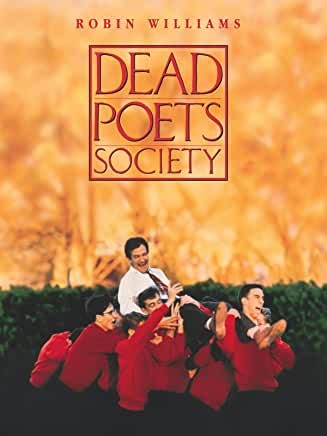Image by L.E. Wilson from RedBubble
Tradition is the first word that appears in the opening scene of Dead Poets Society (1989). It is sewn onto a banner held by a student from Welton Academy, a private elite preparatory school where more than 75% of the graduates go on to the Ivy League.
As the procession of students enter a cavernous hall, we see the other banners being carried: Honor, Discipline, Excellence. The headmaster, Dr. Nolan (Norman Lloyd), begins the welcoming ceremony with these words, “Ladies and gentlemen, boys, the light of knowledge.” A single candle is then used to light, flame by flame, the individual candles held by all the students gathered.
Dead Poets Society (1989) is a drama directed by Peter Weir about a group of students at a private preparatory school, Welton Academy, where their unconventional English teacher, Mr. Keating (Robin Williams), encourages them to seek passion, be freethinkers, and fully express their identity and individuality.
Life Lesson: Carpe Diem — Seize the Day.
🍿Movie Scene Link (movie quote)
Dr. Nolan continues, “100 years ago, in 1859, 41 boys sat in this room and were asked the same question that now greets you at the start of each semester. Gentlemen, what are the four pillars?” The students, all wearing suits and ties, stand up and respond in unison: “Tradition. Honor. Discipline. Excellence.”
Welton Academy’s success is “the result of fervent dedication to the principles taught here,” says Dr. Nolan, “This is why we are the best preparatory school in the United States.” Soon thereafter we are shown the stern, dour, hard-nosed, demanding teachers who make it possible for Welton Academy graduates to attend top colleges and become successful professionals.
The teachers are all disciplinarians, except for one, the new teacher. Enter Mr. Keating (Robin Williams), whistling, making jokes, thrilled to be teaching. He represents another world, romantic, fantastic, poetic, happy—a heaven that exists in stark contrast to the grueling academic rigors and personal struggles that the students face.
He asks his students to call him Mr. Keating, or if they are slightly more daring, “O Captain! My Captain!” which is a line from a poem by Walt Whitman about President Abraham Lincoln.
Mr. Keating wants to teach these kids about life, so he starts with a poem by Robert Herrick, about death:
To the virgins, to make much of time. Gather ye rose-buds while ye may. Old Time is still a-flying; And this same flower that smiles today, tomorrow will be dying.
The Latin term for this sentiment is Carpe Diem, seize the day.
“Why does the writer use these lines?” Mr. Keating asks the class.
Because we are food for worms, lads. Because believe it or not, each and every one of us in this room is one day going to stop breathing, turn cold, and die. […] Peruse some of the faces from the past. You’ve walked past them many times. I don’t think you’ve really looked at them. They’re not that different from you, are they? Same haircuts. Full of hormones, just like you. Invincible, just like you feel. The world is their oyster. They believe they are destined for great things, just like many of you. Their eyes are full of hope, just like you. Did they wait until it was too late to make from their lives even one iota of what they were capable? Because you see, gentlemen, these boys are now fertilizing daffodils. But if you listen real close, you can hear them whisper their legacy to you… Carpe diem. Seize the day, boys. Make your lives extraordinary.
This unconventional teacher pushes his students past their comfort levels. Excrement, Mr. Keating says referring to Dr. J. Evans Pritchard, PhD’s thesis about poetry, which comprises the introductory section in their textbooks. He asks the students to rip out that whole chapter from their books because experts are not to be worshipped. Experts can be wrong. The students hesitate.
“This is a battle, a war. And the casualties could be your hearts and souls,” Mr. Keating tells them.
In my class you will learn to think for yourselves again. You will learn to savor words and language. No matter what anybody tells you, words and ideas can change the world.
Rip out authority. Tear out entire conventions. Mr. Keating persuades the students. He then shares his philosophy, which is in direct opposition to what Dr. J. Evans Pritchard, PhD wrote, about what poetry is really about:
We don’t read and write poetry because it’s cute. We read and write poetry because we are members of the human race. And the human race is filled with passion. And medicine, law, business, engineering—these are noble pursuits and necessary to sustain life. But poetry, beauty, romance, love, these are what we stay alive for. To quote from Whitman, “O me! O life! of the questions of these recurring, of the endless trains of the faithless, of cities filled with the foolish—What good amid these, O me, O life? Answer. That you are here—that life exists and identity. That the powerful play goes on, and you may contribute a verse.” That the powerful play goes on, and you may contribute a verse. What will your verse be?
The goal that Mr. Keating has is not to make his students into artists. Instead, he is trying to teach them to be freethinkers and dreamers. For “only in their dreams can men be truly free. ’Twas always thus, and always thus will be.”
Who are the dead poets? They are romantics who embody the tenants of Henry David Thoreau and five centuries of verse:
I went to the woods because I wanted to live deliberately… I wanted to live deep and suck out all the marrow of life! To put to rout all that was not life… And not, when I had come to die, discover that I had not lived…”
They are moved “to strive, to seek, to find, and not to yield.” How? The answer is revealed when Mr. Keating stands on his desk and asks the students, “why do I stand up here?”
I stand upon my desk to remind myself that we must constantly look at things in a different way. […] Just when you think you know something, you have to look at it in another way. Even though it may seem silly or wrong, you must try. Now, when you read, don’t just consider what the author thinks. Consider what you think. Boys, you must strive to find your own voice, because the longer you wait to begin, the less likely you are to find it at all. Thoreau said, “most men lead lives of quiet desperation.” Don’t be resigned to that. Break out. […] Dare to strike out and find new ground.
Question your own understanding; look at all sides. Find out what you believe and what you want to do, let it fill your soul, and then do it. Be stirred by beauty, by nature, by music, by life. Do something! Carpe Diem, seize the day! Nothing is impossible.
Sport, competition, is a chance for us to have other human beings push us to excel. Join the game. Just don’t let your contribution be ordinary. Find the stuff of revelation. Engage with a loud cry or yell as Walt Whitman did, “I sound my barbaric YAWP over the rooftops of the world.”
Free up your mind. Be a madman.
A crazy madman.
A sweaty-toothed madman.
I close my eyes, and this image floats beside me.
A sweaty-toothed madman with a stare that pounds my brain.
His hands reach out and choke me.
And all the time he’s mumbling, mumbling truth.
Like a blanket that always leaves your feet cold.
You push it, stretch it, it will never be enough.
You kick at it, beat it, it will never cover any of us.
From the moment we enter crying, to the moment we leave dying,
It will just cover your face, as you wail and cry and scream.
Strive, seek, find, and do not yield!
Laughing, crying, tumbling, mumbling
Gotta do more. Gotta be more.
Chaos screaming. Chaos dreaming.
Gotta do more. Gotta be more.
And find your own path. Take a stroll.
Everyone starts off with their own stride, their own pace, but then the pressure to conform stifles individual expression. Don’t let this happen to you. Recognize “the difficulty in maintaining your own beliefs in the face of others.”
We all have a great need for acceptance, but you must trust that your beliefs are unique, your own, even though others may think them odd or unpopular. Even though the herd may go, ‘“that’s baaaaad.” Robert Frost said, “Two roads diverged in the wood, and I—I took the one less traveled by, and that has made all the difference.”
Exercise your right not to do something. Swim against the stream. Engage in passionate experimentation. Don’t be afraid to question authority, or the established precepts. Learn to think for yourself. Demonstrate your conviction and your passion.
Embrace the unorthodox, but remember Mr. Keating’s warning that “sucking the marrow out of life doesn’t mean choking on the bone. Sure, there’s a time for daring, and there’s a time for caution. And a wise man understands which is called for.” Doing something that causes you harm is not daring, it’s stupid because of all the golden opportunities that are lost. Don’t be reckless and self indulgent.
You are not trapped.
Dead poets honor.
And never forget that we don’t read and write poetry because it’s cute. We read and write poetry because it shows we are alive—or once were. Living a life that allows us to respond to poetry proves that we exist, uniquely, and not like sheep, not just following the crowd’s current call for conformity.
Poetry reveals that we were individuals who shone for a moment. We lived. We experienced, as fully as we could, even through movies that enveloped us fully with all the fervor and depth of being of the most passionate thinkers—the dead poets.
So YAWP! O Captain! My Captain!
Rise up and hear the bells;
Rise up—for you the flag is flung—for you the bugle trills;
For you bouquets and ribbon'd wreaths—for you the shores a-crowding;
For you they call, the swaying mass, their eager faces turning;
Visit the moviewise catalogue—a searchable database of one sentence movie summaries, movie quotes, and movie wisdom—for movie recommendations.
Also visit the moviewise store. Get a t-shirt, bag, or pillow with your favorite #LifeLesson from a movie. Reply to this or leave a comment below to make a request.










This is ironic. I have been working on a post about Carpe Diem - but with a bit of a different meaning. Carpe has come to mean 'seize', as in Seize the Day, but researching the Latin, I found it means 'to gather together'. I was struck by the difference between the word 'seize' and 'gather'. Seize feels so aggressive, while gather seems gentle. I have taken this to mean that you can gather together the things that are important for your day and enjoy them.... living in the present moment in a joyful way rather than striving for something. With this feeling in mind, I have taken to think of Carpe Diem as meaning to be free to enjoy what you have in front of you.
I'd love to hear your thoughts on this.
Fantastic review! This is such an inspiring movie (until the tragic ending that is 😢) I watched it for the first time in my 9th grade English class and I remember crying when Neil died. I’m still not over it to this day. I understand the message and why it was done, but I wish Neil would have made a different choice and chose to live rebelliously instead of giving up.